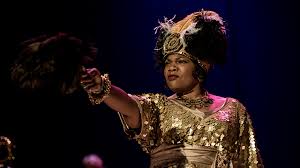Chad and Mary decided to have a conversation about the HBO original film Bessie to post to their respective media blogs. So, here goes…
Mary: Did you know that when I was an undergraduate student at Wake Forest I worked as an announcer at WFDD and had a weekly jazz show on Friday nights? I closed my set each week with Bessie Smith’s classic song “Empty Bed Blues.” I don’t know a lot about jazz actually — knew more back then than now — but I’ve always had a penchant for the blues, and, after all, Bessie Smith is The Empress of the Blues.
Chad: No, you never told me that story! The Empress of the Blues–she certainly had a lot of emotion to pull from when she performed, and that intensity certainly came out in her life and her struggles. I found myself saying to myself that the film shows a story that is not at all atypical in biopics of not only musicians, but of people from all professions/walks of life. But the reason it is so “typical” is because these types of life struggles are so common. That is not to say that this film is not unique or that the performances were not spectacular because they were. But as for the story itself, what stood out to you the most?
Mary: I was excited that the film was finally made (there’s been a lot of talk about a Bessie Smith biopic over the years), and I thought Queen Latifah was wonderful (I could probably watch her read the phone book, as the saying goes), but I was not enamored with the film overall. I read the Chris Albertson biography about Bessie some years ago, and was taken with the story. While some events recounted fit what I remembered, the ending was a real disappointment. Her untimely death was as dramatic as her life.
Chad: I was very impressed with Mo’Nique’s performance. I want to see more of her. She can do anything. The characters’ relationship seemed to be one of mutual, enduring respect–that is how the film portrayed it, at least. And ahh–about the ending. I just took the opportunity to read a bit about it and see what was “left out.”
Mary: Yes, all of the performances were strong, but Mo’Nique’s Ma Rainey was particularly compelling. Of course, the actual Ma Rainey was quite a character! By the way, the music you heard in this film sounds a lot like some of the original recordings. That was one of my (several) pet peeves with The Color Purple: the music in that film should have sounded more like the authentic blues singers featured in Bessie. For people who haven’t listened to some of these blues singers, the difference may not have been so striking, but for me it was a major stumbling block to connecting with that film and one of the joys in the HBO biopic.
Chad: I think a lot of people forget just how long ago Bessie lived. I think it is sometimes hard for people to conceptualize the first three decades of the twentieth century, for some reason. It is like they go to 1865 and then skip to the Depression or all the way to the 1940s. I’ve always liked to see the time period of the film depicted, and I especially pay attention to how racial terrorism is portrayed.
Mary: Excellent point, Chad. I’m probably more critical of the film than most people because I’ve spent a lot of time thinking about Bessie Smith’s life and enjoying her music. Still, I’m glad a film version of her life was finally completed.
Chad: Yes, I am finally learning about how long it took. While I was fully aware that I was watching a biopic–with all of the formulaic trappings–I, as I often do, took enjoyment out of the performances, which, as we agreed, were great. I am excited to see the Emmy nominations when they come out in a few weeks.
You can follow Chad’s blog here.

Reblogged this on ChadEHarris.
I have been absent for a while, but now I remember why I used to love this site. Thanks, I will try and check back more often. How frequently you update your website?
Not as often as I should! You’ve motivated me to try to catch up over the next day or so!